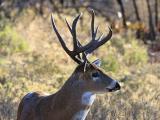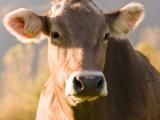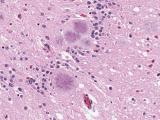Jan 23, 2006 (CIDRAP News) Canada today reported its fourth case of bovine spongiform encephalopathy (BSE), or mad cow disease, raising concern about the possibility of another US ban on Canadian beef and cattle.
The case was found in a 6-year-old crossbred cow in north-central Alberta that had shown possible signs of BSE, the Canadian Food Inspection Agency (CFIA) said. The disease was detected through Canada's regular BSE surveillance program.
"This detection is consistent with a low level of disease and does not indicate an increased risk of BSE in Canada," the agency said.
US Agriculture Secretary Mike Johanns expressed agreement, saying in a statement that he had assured Canadian Agriculture Minister Andy Mitchell that he anticipated no changes in the rules on importation of Canadian beef and cattle.
"As I've said many times, our beef trade decisions follow internationally accepted guidelines that are based in science," Johanns said. He added that the US would "continue to evaluate the situation."
The United States banned Canadian beef after the country's first case was discovered in May 2003. In August 2003 the USDA allowed imports of boneless Canadian beef from cattle less than 30 months old. In July 2005, the border was reopened to live Canadian cattle destined for slaughter before reaching the age of 30 months.
The CFIA said the cause of the latest case was unknown but most likely was contaminated feed. The 6-year-old cow would have been born at least 2 years after 1997, when Canada and the United States moved to prevent the spread of BSE by banning the use of protein from cattle and other ruminants in cattle feed.
Dennis Laycraft, executive vice president of the Canadian Cattlemen's Association, said the case didn't come as a big surprise, according to a Reuters report. "It's obviously unwelcome, but pretty well around the world there have been what's referred to as 'BARB' cattle. Those are born after the ruminant ban," he said. It probably took time for cattle feed produced under the old rules to be cleared from the system, officials have said.
The CFIA said it would investigate feeding and storage practices at the farm where the cow lived, as well as the production and source of feeds used there. Following international standards, the agency also promised to find and test cattle born on the farm within a year before or after the infected cow, as well as any offspring of the cow.
"This case does support the need for Canada to continue to move towards enhancing the current feed ban," the CFIA said.
Rapid tests on samples from the infected cow initially were inconclusive, but the case was confirmed through further rapid tests and "gold standard" tests at the CFIA's National Centre for Foreign Animal Diseases in Winnipeg, Man., the agency said.
Canada's second and third BSE cases were reported in January 2005, both in cows from Alberta. Humans who eat meat products from BSE-infected cattle are believed to be at risk for variant Creutzfeldt-Jakob disease (vCJD), the fatal human equivalent of BSE.
See also:
















